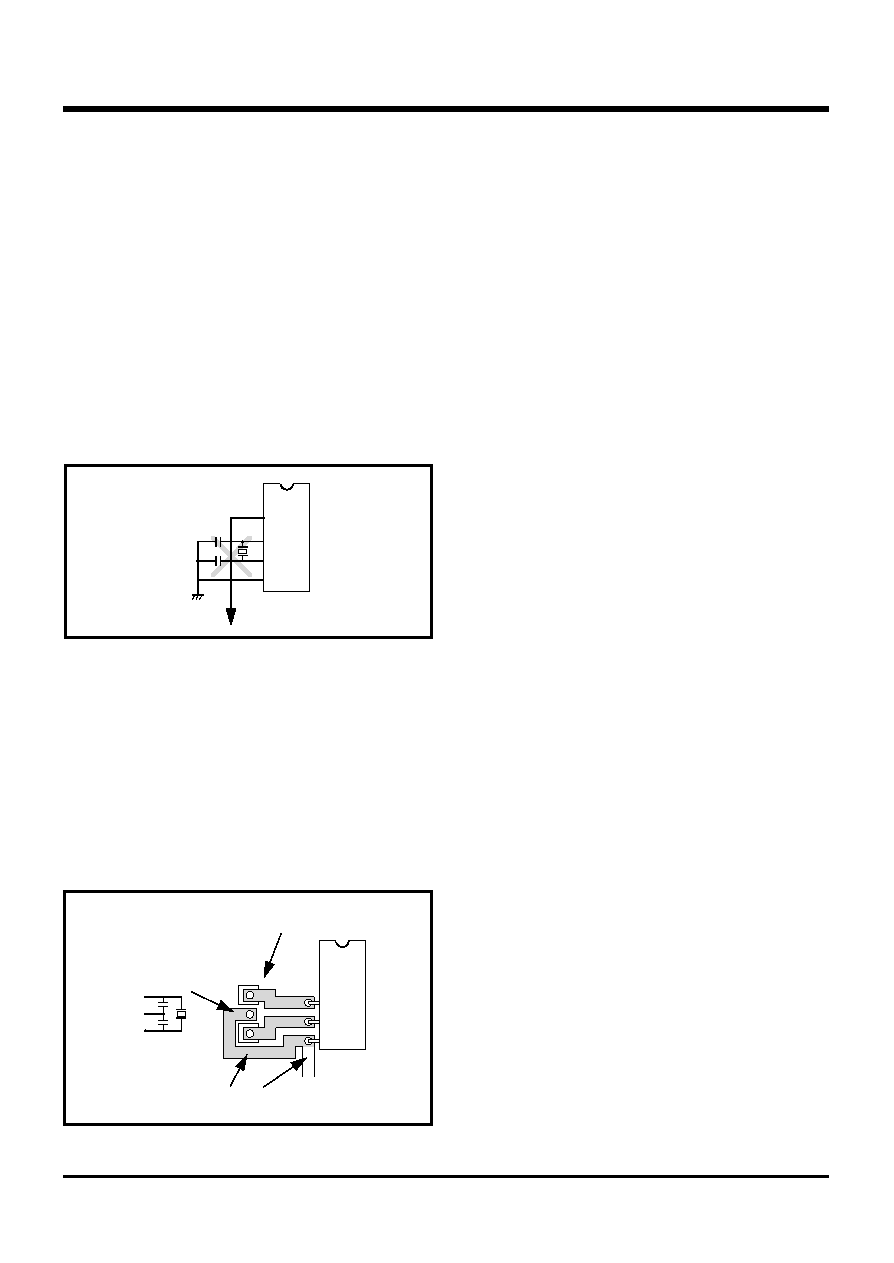- 您現(xiàn)在的位置:買賣IC網(wǎng) > PDF目錄69010 > M34501E4FP 4-BIT, OTPROM, 4.4 MHz, MICROCONTROLLER, PDSO20 PDF資料下載
參數(shù)資料
| 型號(hào): | M34501E4FP |
| 元件分類: | 微控制器/微處理器 |
| 英文描述: | 4-BIT, OTPROM, 4.4 MHz, MICROCONTROLLER, PDSO20 |
| 封裝: | 0.300 INCH, PLASTIC, SOP-20 |
| 文件頁(yè)數(shù): | 123/213頁(yè) |
| 文件大小: | 3014K |
| 代理商: | M34501E4FP |
第1頁(yè)第2頁(yè)第3頁(yè)第4頁(yè)第5頁(yè)第6頁(yè)第7頁(yè)第8頁(yè)第9頁(yè)第10頁(yè)第11頁(yè)第12頁(yè)第13頁(yè)第14頁(yè)第15頁(yè)第16頁(yè)第17頁(yè)第18頁(yè)第19頁(yè)第20頁(yè)第21頁(yè)第22頁(yè)第23頁(yè)第24頁(yè)第25頁(yè)第26頁(yè)第27頁(yè)第28頁(yè)第29頁(yè)第30頁(yè)第31頁(yè)第32頁(yè)第33頁(yè)第34頁(yè)第35頁(yè)第36頁(yè)第37頁(yè)第38頁(yè)第39頁(yè)第40頁(yè)第41頁(yè)第42頁(yè)第43頁(yè)第44頁(yè)第45頁(yè)第46頁(yè)第47頁(yè)第48頁(yè)第49頁(yè)第50頁(yè)第51頁(yè)第52頁(yè)第53頁(yè)第54頁(yè)第55頁(yè)第56頁(yè)第57頁(yè)第58頁(yè)第59頁(yè)第60頁(yè)第61頁(yè)第62頁(yè)第63頁(yè)第64頁(yè)第65頁(yè)第66頁(yè)第67頁(yè)第68頁(yè)第69頁(yè)第70頁(yè)第71頁(yè)第72頁(yè)第73頁(yè)第74頁(yè)第75頁(yè)第76頁(yè)第77頁(yè)第78頁(yè)第79頁(yè)第80頁(yè)第81頁(yè)第82頁(yè)第83頁(yè)第84頁(yè)第85頁(yè)第86頁(yè)第87頁(yè)第88頁(yè)第89頁(yè)第90頁(yè)第91頁(yè)第92頁(yè)第93頁(yè)第94頁(yè)第95頁(yè)第96頁(yè)第97頁(yè)第98頁(yè)第99頁(yè)第100頁(yè)第101頁(yè)第102頁(yè)第103頁(yè)第104頁(yè)第105頁(yè)第106頁(yè)第107頁(yè)第108頁(yè)第109頁(yè)第110頁(yè)第111頁(yè)第112頁(yè)第113頁(yè)第114頁(yè)第115頁(yè)第116頁(yè)第117頁(yè)第118頁(yè)第119頁(yè)第120頁(yè)第121頁(yè)第122頁(yè)當(dāng)前第123頁(yè)第124頁(yè)第125頁(yè)第126頁(yè)第127頁(yè)第128頁(yè)第129頁(yè)第130頁(yè)第131頁(yè)第132頁(yè)第133頁(yè)第134頁(yè)第135頁(yè)第136頁(yè)第137頁(yè)第138頁(yè)第139頁(yè)第140頁(yè)第141頁(yè)第142頁(yè)第143頁(yè)第144頁(yè)第145頁(yè)第146頁(yè)第147頁(yè)第148頁(yè)第149頁(yè)第150頁(yè)第151頁(yè)第152頁(yè)第153頁(yè)第154頁(yè)第155頁(yè)第156頁(yè)第157頁(yè)第158頁(yè)第159頁(yè)第160頁(yè)第161頁(yè)第162頁(yè)第163頁(yè)第164頁(yè)第165頁(yè)第166頁(yè)第167頁(yè)第168頁(yè)第169頁(yè)第170頁(yè)第171頁(yè)第172頁(yè)第173頁(yè)第174頁(yè)第175頁(yè)第176頁(yè)第177頁(yè)第178頁(yè)第179頁(yè)第180頁(yè)第181頁(yè)第182頁(yè)第183頁(yè)第184頁(yè)第185頁(yè)第186頁(yè)第187頁(yè)第188頁(yè)第189頁(yè)第190頁(yè)第191頁(yè)第192頁(yè)第193頁(yè)第194頁(yè)第195頁(yè)第196頁(yè)第197頁(yè)第198頁(yè)第199頁(yè)第200頁(yè)第201頁(yè)第202頁(yè)第203頁(yè)第204頁(yè)第205頁(yè)第206頁(yè)第207頁(yè)第208頁(yè)第209頁(yè)第210頁(yè)第211頁(yè)第212頁(yè)第213頁(yè)

4501 Group User’s Manual
APPENDIX
3-39
3.4 Notes on noise
Fig. 3.4.9 Wiring to a signal line where potential
levels change frequently
(3)
Oscillator protection using VSS pattern
As for a two-sided printed circuit board, print
a VSS pattern on the underside (soldering side)
of the position (on the component side) where
an oscillator is mounted.
Connect the VSS pattern to the microcomputer
VSS pin with the shortest possible wiring.
Besides, separate this VSS pattern from other
VSS patterns.
XIN
XOUT
VSS
CNTR
Do not cross
N.G.
XIN
XOUT
VSS
An example of VSS patterns on the
underside of a printed circuit board
Oscillator wiring
pattern example
Separate the VSS line for oscillation from other VSS lines
3.4.5 Setup for I/O ports
Setup I/O ports using hardware and software as
follows:
<Hardware>
Connect a resistor of 100
or more to an I/O port
in series.
<Software>
As for an input port, read data several times by
a program for checking whether input levels are
equal or not.
As for an output port or an I/O port, since the
output data may reverse because of noise, rewrite
data to its output latch at fixed periods.
Rewrite data to pull-up control registers at fixed
periods.
3.4.6 Providing of watchdog timer function by
software
If a microcomputer runs away because of noise or
others, it can be detected by a software watchdog
timer and the microcomputer can be reset to normal
operation. This is equal to or more effective than
program runaway detection by a hardware watchdog
timer. The following shows an example of a watchdog
timer provided by software.
In the following example, to reset a microcomputer
to normal operation, the main routine detects errors
of the interrupt processing routine and the interrupt
processing routine detects errors of the main routine.
This example assumes that interrupt processing is
repeated multiple times in a single main routine
processing.
(2)
Installing oscillator away from signal lines
where potential levels change frequently
Install an oscillator and a connecting pattern
of an oscillator away from signal lines where
potential levels change frequently. Also, do
not cross such signal lines over the clock lines
or the signal lines which are sensitive to noise.
q Reason
Signal lines where potential levels change
frequently (such as the CNTR pin signal
line) may affect other lines at signal rising
edge or falling edge. If such lines cross
over a clock line, clock waveforms may be
deformed, which causes a microcomputer
failure or a program runaway.
Fig. 3.4.10 VSS pattern on the underside of an
oscillator
相關(guān)PDF資料 |
PDF描述 |
|---|---|
| M34501M2-XXXFP | 4-BIT, MROM, MICROCONTROLLER, PDSO20 |
| M34501E4FP | 4-BIT, OTPROM, MICROCONTROLLER, PDSO20 |
| M34501M4-XXXFP | 4-BIT, MROM, MICROCONTROLLER, PDSO20 |
| M34501E4FP | 4-BIT, OTPROM, MICROCONTROLLER, PDSO20 |
| M34502M2-XXXFP | 4-BIT, MROM, MICROCONTROLLER, PDSO24 |
相關(guān)代理商/技術(shù)參數(shù) |
參數(shù)描述 |
|---|---|
| M34501M2 | 制造商:MITSUBISHI 制造商全稱:Mitsubishi Electric Semiconductor 功能描述:SINGLE-CHIP 4-BIT CMOS MICROCOMPUTER |
| M34501M2-XXXFP | 制造商:RENESAS 制造商全稱:Renesas Technology Corp 功能描述:SINGLE-CHIP 4-BIT CMOS MICROCOMPUTER |
| M34501M4 | 制造商:MITSUBISHI 制造商全稱:Mitsubishi Electric Semiconductor 功能描述:SINGLE-CHIP 4-BIT CMOS MICROCOMPUTER |
| M34501M4-XXXFP | 制造商:MITSUBISHI 制造商全稱:Mitsubishi Electric Semiconductor 功能描述:SINGLE-CHIP 4-BIT CMOS MICROCOMPUTER |
| M34502E4 | 制造商:RENESAS 制造商全稱:Renesas Technology Corp 功能描述:SINGLE-CHIP 4-BIT CMOS MICROCOMPUTER |
發(fā)布緊急采購(gòu),3分鐘左右您將得到回復(fù)。